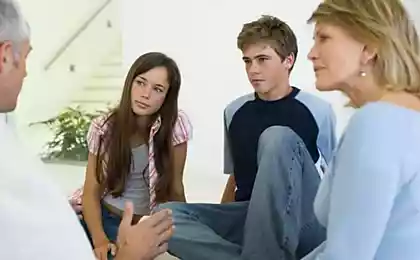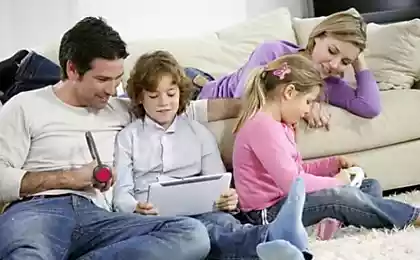462
The rules of life with a teenager: required reading for all parents
Psychologist Mikhail Labkovsky talks about how to learn to find a common language with your grown-up child. Simple and clear! Required reading for all parents.
Usually parents either miss the point of growing his child, somehow not able to gather strength and realize that it started and in full swing. Well, either flatly refuse to believe in it.
And it is very important to recognize puberty and at the same time not to leave with a sense that the aggressive teenager in the mirror – the same child that needs your love and support. Needs as ever.

However, the most common ways to get in contact with a teenager continue to be:
a) basilisa mother hysteria, screaming, from which it gets worse;
b) aggressive father bursts into the situation by saying: "I'm all right now will beat the crap!"
Plus around grandma spinning like Plushenko in the clip around Bilan.
Let's start from the beginning.
So, your child with the angelic cilia, smelling like a rose Bush turned into a screaming, smelly, argumentative, sometimes hairy hedgehog. Usually he doesn't want to read, to learn and to raise his eyes from the tablet.
This continues for more than one year, and the relationships that are formed during this period may persist for life. Adolescence will pass, and alienation will be consolidated. If...
If you do not remember that "transition" is the MOST difficult age in a person's life that cannot be compared with any more age-related crisis. Neither in childhood nor in old age – neither 30 nor 40, nor in 85 the person is not such a difficult life. Because the child starts to rise sharply, the skeleton and muscle mass increase, and the cardiovascular system lags behind. All of this in complete mismatch to each other and not aligned. Hormones are jumping. And symptoms that adults are the consequences of extreme stress, such as the failure of the menstrual cycle, fatigue, mood swings in adolescence are considered normal costs increase.
Well, imagine how hard it is?
Hence the conflicts, complaints, grievances. Be the first pimples and first complexes. Sweating increases, performance will fall. (In elementary school according to statistics performance when children learn at 4-5, is 50%, in high school it is 10%. In connection with pubertatnom study ceases to be a major activity of the child). In life included long hours of standing in front of the mirror and the smell of tobacco. Well, plus or minus all sorts of nightmarish phenomena that until recently parents in a nightmare could not dream of: drugs (according to official data, in Russia the drugs are trying for the first time in 13 years), sex (15), alcohol and partying at night. Although it would seem that recently appointed mother the curfew was not an empty sound.
And if the child ceases to attend school, the ancestors realize that, of course, you can ask "why?" But amid everything else, is not the worst.
A huge world of a teenager tragically narrows to some stupid terms of adult problems: "Why I have no boyfriend?" or "Why am I the smallest in the class?" And my favorite typical teenage troubles: "am I different?" and "Do I look like?"
Usually puberty starts earlier in girls (11-13), later in boys (12-15). Although much depends on factors such as nationality and genes.
And now they are no longer children but not yet adults, and this goes the roof. This can happen dramatically and suddenly, as described by françoise Sagan this summer.
I suggest:
To relax Remember that you, too, was 14 years old. Remember how in the night the mother called your friends, and the anxious father was standing in the window. In General, to remember how it was you and you still survived.
To understand that the child is grown Has secondary sexual characteristics and agile mind. And now he is in a morbid state, which affects in the first place, he himself, and suffering more than you. To take his manhood. To show him respect as an adult and provide support.
As often as possible to show understanding and sympathy for You, of course, a living person, and when I hear something frankly boorish – have the right to Express their dissatisfaction. But still try to try to go days without aggression and scandals.
Bring home the subject of school in General. Take her out with the trash. To talk about school only if the child initiates the conversation. (This includes conversations about assessment, exam, results of which allegedly depends the future of the whole family, threats about the army, work as a janitor, talks about the importance of going to the theater and museums, etc.) If you don't make it a brain, lecture, have a chance to hear what he says. Again: if you close your mouth, maybe your child will want something to tell you and to share.
It is not necessary to remove the left hand the tablet, and the right to put a book into the hands of a teenager. Useless.
To give freedom to the child to form a conscious attitude to life, have to give him some freedom. Because some things are just better to pass in 15 years, so they don't catch up in 20. The fact remains: children who are protected, which were worn, which struggled tried "not to miss" in the face of real life, simply do not know how to dispose of it, do not know how to live with your mind and as adults, all the time looking for some support.
And often it turns out that children from families where all were forbidden, for example, to smoke and drink, trying enrolling in the Institute. And this is infantilism, and it looks stupid and ridiculous. By this time the peers have all tried, partly matured and outgrown some of the temptations.
But the "kids" who lived on a rigid schedule, which is all the time controlled, which is not trusted, in a word, zorganizowanie children, finding themselves in a precarious situation, do not know how to behave. They are not used and do not know how to make decisions. Do not know and are not accustomed to resist temptation, to refuse. But I really want to be accepted in the company, do you dream that your peers consider them for their own. Including and so become addicted.
So to control pointless! Total control and distrust only teaches the child to lie. One solution is to give freedom today! That the child experienced some situation, has learned to conduct myself in them. Trust and confidence that your child will understand himself what is good and what is bad – that's the key to your peace of mind! Not every minute trying to determine his whereabouts and well-being.
So, please, even in the most difficult moments of exacerbation of the relationship with the adolescent son or daughter, do not forget: it's still him, the kid with the angelic eyes, and he still has no other parents.
And a short memo summarizing the "Rules of life with a teenager" that need to be followed if you want to go through puberty unscathed.
Try and learn:
To BE by his side always;
— to be able to LISTEN, not interrupting, when a teenager says something so he could speak out and not fear that in response to any phrase you're going to push through some of his educational ideas ("you see! I told you!");
— to be able to be SILENT when a child wants nothing more to tell;
— to be able to say no when necessary. To refuse firmly, but kindly;
— to be able to LET go and TRUST when the child begins to live his "personal" life (friends, girlfriends, travel, correspondence);
— be able to NEGOTIATE with the child, without bringing the situation before the conflict (he always needs something from you and you from him: "you will not help – do not get pocket money"), and adhere to agreements;
— To CREATE such conditions that the child had no reason to lie to you (lies three reasons: fear, gain and psychopathology, two of them you have the power to exclude, the third is to cure);
— To communicate questions like:
— How you doing in school?
— Why are you silent?
— Why are you so sad?
— Why are you so dirty?
— I watched the electronic diary and want to talk about it... and so on.
— TALK exhortation, to COMMUNICATE on equal terms;
— learn to talk ABOUT SCHOOL and about life in General;
— do not try to control everything in the life of a teenager (this is impossible anyway) but to educate so that he knew how to properly respond to emergency situation (violence, alcohol, drugs, etc.);
even punishing, to make sure that the child never doubted that YOU LOVE HIM.published
Author Michael Labkovsky
P. S. And remember, just changing your mind — together we change the world! ©
Join us in Facebook , Vkontakte, Odnoklassniki
Source: liwli.ru/lifestyle/pravila-zhizni-s-podrostkom/
Usually parents either miss the point of growing his child, somehow not able to gather strength and realize that it started and in full swing. Well, either flatly refuse to believe in it.
And it is very important to recognize puberty and at the same time not to leave with a sense that the aggressive teenager in the mirror – the same child that needs your love and support. Needs as ever.

However, the most common ways to get in contact with a teenager continue to be:
a) basilisa mother hysteria, screaming, from which it gets worse;
b) aggressive father bursts into the situation by saying: "I'm all right now will beat the crap!"
Plus around grandma spinning like Plushenko in the clip around Bilan.
Let's start from the beginning.
So, your child with the angelic cilia, smelling like a rose Bush turned into a screaming, smelly, argumentative, sometimes hairy hedgehog. Usually he doesn't want to read, to learn and to raise his eyes from the tablet.
This continues for more than one year, and the relationships that are formed during this period may persist for life. Adolescence will pass, and alienation will be consolidated. If...
If you do not remember that "transition" is the MOST difficult age in a person's life that cannot be compared with any more age-related crisis. Neither in childhood nor in old age – neither 30 nor 40, nor in 85 the person is not such a difficult life. Because the child starts to rise sharply, the skeleton and muscle mass increase, and the cardiovascular system lags behind. All of this in complete mismatch to each other and not aligned. Hormones are jumping. And symptoms that adults are the consequences of extreme stress, such as the failure of the menstrual cycle, fatigue, mood swings in adolescence are considered normal costs increase.
Well, imagine how hard it is?
Hence the conflicts, complaints, grievances. Be the first pimples and first complexes. Sweating increases, performance will fall. (In elementary school according to statistics performance when children learn at 4-5, is 50%, in high school it is 10%. In connection with pubertatnom study ceases to be a major activity of the child). In life included long hours of standing in front of the mirror and the smell of tobacco. Well, plus or minus all sorts of nightmarish phenomena that until recently parents in a nightmare could not dream of: drugs (according to official data, in Russia the drugs are trying for the first time in 13 years), sex (15), alcohol and partying at night. Although it would seem that recently appointed mother the curfew was not an empty sound.
And if the child ceases to attend school, the ancestors realize that, of course, you can ask "why?" But amid everything else, is not the worst.
A huge world of a teenager tragically narrows to some stupid terms of adult problems: "Why I have no boyfriend?" or "Why am I the smallest in the class?" And my favorite typical teenage troubles: "am I different?" and "Do I look like?"
Usually puberty starts earlier in girls (11-13), later in boys (12-15). Although much depends on factors such as nationality and genes.
And now they are no longer children but not yet adults, and this goes the roof. This can happen dramatically and suddenly, as described by françoise Sagan this summer.
I suggest:
To relax Remember that you, too, was 14 years old. Remember how in the night the mother called your friends, and the anxious father was standing in the window. In General, to remember how it was you and you still survived.
To understand that the child is grown Has secondary sexual characteristics and agile mind. And now he is in a morbid state, which affects in the first place, he himself, and suffering more than you. To take his manhood. To show him respect as an adult and provide support.
As often as possible to show understanding and sympathy for You, of course, a living person, and when I hear something frankly boorish – have the right to Express their dissatisfaction. But still try to try to go days without aggression and scandals.
Bring home the subject of school in General. Take her out with the trash. To talk about school only if the child initiates the conversation. (This includes conversations about assessment, exam, results of which allegedly depends the future of the whole family, threats about the army, work as a janitor, talks about the importance of going to the theater and museums, etc.) If you don't make it a brain, lecture, have a chance to hear what he says. Again: if you close your mouth, maybe your child will want something to tell you and to share.
It is not necessary to remove the left hand the tablet, and the right to put a book into the hands of a teenager. Useless.
To give freedom to the child to form a conscious attitude to life, have to give him some freedom. Because some things are just better to pass in 15 years, so they don't catch up in 20. The fact remains: children who are protected, which were worn, which struggled tried "not to miss" in the face of real life, simply do not know how to dispose of it, do not know how to live with your mind and as adults, all the time looking for some support.
And often it turns out that children from families where all were forbidden, for example, to smoke and drink, trying enrolling in the Institute. And this is infantilism, and it looks stupid and ridiculous. By this time the peers have all tried, partly matured and outgrown some of the temptations.
But the "kids" who lived on a rigid schedule, which is all the time controlled, which is not trusted, in a word, zorganizowanie children, finding themselves in a precarious situation, do not know how to behave. They are not used and do not know how to make decisions. Do not know and are not accustomed to resist temptation, to refuse. But I really want to be accepted in the company, do you dream that your peers consider them for their own. Including and so become addicted.
So to control pointless! Total control and distrust only teaches the child to lie. One solution is to give freedom today! That the child experienced some situation, has learned to conduct myself in them. Trust and confidence that your child will understand himself what is good and what is bad – that's the key to your peace of mind! Not every minute trying to determine his whereabouts and well-being.
So, please, even in the most difficult moments of exacerbation of the relationship with the adolescent son or daughter, do not forget: it's still him, the kid with the angelic eyes, and he still has no other parents.
And a short memo summarizing the "Rules of life with a teenager" that need to be followed if you want to go through puberty unscathed.
Try and learn:
To BE by his side always;
— to be able to LISTEN, not interrupting, when a teenager says something so he could speak out and not fear that in response to any phrase you're going to push through some of his educational ideas ("you see! I told you!");
— to be able to be SILENT when a child wants nothing more to tell;
— to be able to say no when necessary. To refuse firmly, but kindly;
— to be able to LET go and TRUST when the child begins to live his "personal" life (friends, girlfriends, travel, correspondence);
— be able to NEGOTIATE with the child, without bringing the situation before the conflict (he always needs something from you and you from him: "you will not help – do not get pocket money"), and adhere to agreements;
— To CREATE such conditions that the child had no reason to lie to you (lies three reasons: fear, gain and psychopathology, two of them you have the power to exclude, the third is to cure);
— To communicate questions like:
— How you doing in school?
— Why are you silent?
— Why are you so sad?
— Why are you so dirty?
— I watched the electronic diary and want to talk about it... and so on.
— TALK exhortation, to COMMUNICATE on equal terms;
— learn to talk ABOUT SCHOOL and about life in General;
— do not try to control everything in the life of a teenager (this is impossible anyway) but to educate so that he knew how to properly respond to emergency situation (violence, alcohol, drugs, etc.);
even punishing, to make sure that the child never doubted that YOU LOVE HIM.published
Author Michael Labkovsky
P. S. And remember, just changing your mind — together we change the world! ©
Join us in Facebook , Vkontakte, Odnoklassniki
Source: liwli.ru/lifestyle/pravila-zhizni-s-podrostkom/
The child is afraid of the dark: how to chase a monster from under the bed?
Recipes with apples from the classics of Russian literature























